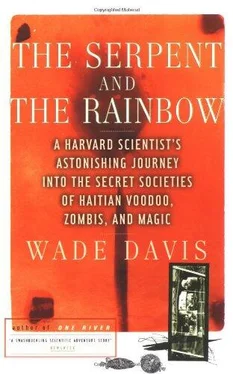Wade Davis - The Serpent and the Rainbow
Здесь есть возможность читать онлайн «Wade Davis - The Serpent and the Rainbow» весь текст электронной книги совершенно бесплатно (целиком полную версию без сокращений). В некоторых случаях можно слушать аудио, скачать через торрент в формате fb2 и присутствует краткое содержание. Год выпуска: 1985, Издательство: Simon & Schuster, Жанр: Старинная литература, на английском языке. Описание произведения, (предисловие) а так же отзывы посетителей доступны на портале библиотеки ЛибКат.
- Название:The Serpent and the Rainbow
- Автор:
- Издательство:Simon & Schuster
- Жанр:
- Год:1985
- ISBN:нет данных
- Рейтинг книги:5 / 5. Голосов: 1
-
Избранное:Добавить в избранное
- Отзывы:
-
Ваша оценка:
- 100
- 1
- 2
- 3
- 4
- 5
The Serpent and the Rainbow: краткое содержание, описание и аннотация
Предлагаем к чтению аннотацию, описание, краткое содержание или предисловие (зависит от того, что написал сам автор книги «The Serpent and the Rainbow»). Если вы не нашли необходимую информацию о книге — напишите в комментариях, мы постараемся отыскать её.
The Serpent and the Rainbow — читать онлайн бесплатно полную книгу (весь текст) целиком
Ниже представлен текст книги, разбитый по страницам. Система сохранения места последней прочитанной страницы, позволяет с удобством читать онлайн бесплатно книгу «The Serpent and the Rainbow», без необходимости каждый раз заново искать на чём Вы остановились. Поставьте закладку, и сможете в любой момент перейти на страницу, на которой закончили чтение.
Интервал:
Закладка:
All morning the trail descending to the falls quivered with the mirage of pilgrims coming and going on foot. There was no order or routine to their arrival, but it was a constant stream—as many as fifteen thousand over the course of the three-day celebration—and the basin nestled into the side of the mountain swelled like a festive carnival tent to absorb everyone. It was to be a morning of joy; one saw it on the faces of the elfin children, the young city dandies leaping over the rocks like cats, the ragged peasants laughing derisively at a fat, preposterous government official. But for the sincere it was also a moment of purification and healing, one chance each year to partake of the power of the water, to bathe and drink, and to bottle a small sample of the cold, thin blood of the divine. Already on the long, stony trail that had brought them from Ville Bonheur they had paused at least once at the tree of Legba, the guardian of the crossroads, to light a candle to invoke his support. Now before entering the water, they gathered all around the periphery of the basin where the herbalists had set up their dusty stations, displaying sooty boxes, hunks of root, loose bags of mombin leaves, and tubs of water and herbs. Houngan and mambo spoke of magic done with dew, and tied brightly colored strings to barren young women, or around the plump bellies of matrons who, in time, would dangle the strings from wax stuck to the surface of the mapou, consecrated for the blessings of the gods. In the base of one of the buttresses, a young boy hung his head as he waited to be anointed by the mambo. To one side, a houngan massaged the breast of an old woman. Scattered among the long rows of holy men and women were the hawkers pitching food for the sacrifices, tin medallions, icons, and candles. A young operator content with his gods pulled out a game-board and dice and set up shop.
One needed only to touch the water to feel its grace, and for some it was enough to dip in the shallow silvery pools, leaving their offerings of corn and rice and cassava in small piles. But most went directly to the cascades, women and men, old and young, baring their breasts and scrambling up the wet slippery bedrock that rose in a series of steps toward the base of the highest falls. At the lip of the escarpment the river forked twice, sending not one but three waterfalls plunging over a hundred feet. What was not lost in mist struck the rocks with tremendous force, dividing again into many smaller shoots, and each one of them in turn became a sanctuary for the pilgrims. The women removed their soiled clothes, casting them to the water, and stood, arms outstretched, beseeching the spirits. Their prayers were lost to the thunderous roar of the falls, the piercing shouts, and the screams of flocks of children. Everything stood in flux. No edge and no separation—the sounds and sights, the passions, the lush soaring vegetation, primeval and rare. Young men stood directly beneath the head of the falls; the force tore off the rest of their clothes and battered their numb bodies against the rocks, but still their hands clung.
“Ayida Wedo!” someone called, his shout a whisper. It was true. Mist fell over the basin, and the water splintered the sunlight, leaving a rainbow arched across the entire face of the waterfall. It was the goddess of many colors, delicate and ephemeral, come to rejoice with her mate. Ayida Wedo the Rainbow and Damballah the Serpent, the father of the falling waters and the reservoir of all spiritual wisdom. Just to bathe in the cold, thin waters was to open oneself to Damballah, and already at the base of the waterfall, in the shadow of the rainbow, there were as many as a hundred pilgrims, mounted by the spirit, slithering across the wet rocks.
In the beginning, it is said, there was only the Great Serpent, whose seven thousand coils lay beneath the earth, holding it in place that it might not fall into the abysmal sea. In time, the Serpent began to move, unleashing its undulating flesh, which rose slowly into a great spiral that enveloped the Universe. In the heavens, it released stars and all the celestial bodies; on earth, it brought forth Creation, winding its way through the molten slopes to carve rivers, which like veins became the channels through which flowed the essence of all life. In the searing heat it forged metals, and rising again into the sky it cast lightning bolts to the earth that gave birth to the sacred stones. Then it lay along the path of the sun and partook of its nature.
Within its layered skin, the Serpent retained the spring of eternal life, and from the zenith it let go the waters that filled the rivers upon which the people would nurse. As the water struck the earth, the Rainbow arose, and the Serpent took her as his wife. Their love entwined them in a cosmic helix that arched across the heavens. In time their fusion gave birth to the spirit that animates blood. Women learned to filter this divine substance through their breasts to produce milk, just as men passed it through their testes to create semen. The Serpent and the Rainbow instructed women to remember these blessings once each month, and they taught men to damn the flow so that the belly might swell and bring forth new life. Then, as a final gift, they taught the people to partake of the blood as a sacrament, that they might become the spirit and embrace the wisdom of the Serpent.
For the nonbeliever, there is something profoundly disturbing about spirit possession. Its power is raw, immediate, and undeniably real, devastating in a way to those of us who do not know our gods. To witness sane and in every regard respectable individuals experiencing direct rapport with the divine fills one with either fear, which finds its natural outlet in disbelief, or deep envy. The psychologists who have attempted to understand possession from a scientific perspective have tended to fall into the former category, and perhaps because of this they have come up with some bewildering conclusions, derived in part from quite unwarranted assumptions. For one, because the mystical frame of reference of the vodounist involves issues that cannot be approached by their calculus—the existence or nonexistence of spirits, for example—the actual beliefs of the individual experiencing possession are dismissed as externalities. To the believer, the dissociation of personality that characterizes possession is the hand of divine grace; to the psychologist it is but a symptom of an “overwhelming psychic disruption.” One prominent Haitian physician, acknowledging that possession occurs under strict parameters of ritual, nevertheless concluded that it was the result of “widespread pathology in the countryside which far from being the result of individual or social experience was related to the genetic character of the Haitian people,” a racial psychosis, as he put it elsewhere, of a people “living on nerves.” Even individuals otherwise sympathetic to vodoun have made extraordinary statements. Dr. Jean Price-Mars, one of the early intellectual champions of the religion, considered possession a behavior of “psychically disequilibrated persons with a mytho-maniacal constitution”; mythomaniacal being defined as “a conscious pathological tendency towards lying and the creation of imaginary fables.”
These wordy explanations ring most hollow when they are applied to certain irrefutable physical attributes of the possessed. While recognizing, for example, the ability of the believer to place with impunity his or her hands into boiling water, another respected Haitian medical authority noted that “primitives submit coldly to surgical operations without anesthesia that would plunge us into the most terrifying shock.” Rather tentatively he added that in asylums patients had been known to burn themselves and not notice even as the flesh fell away. What this well-meaning physician failed to note, among other things, was the perennial observation that the flesh of the possessed is not harmed.
Читать дальшеИнтервал:
Закладка:
Похожие книги на «The Serpent and the Rainbow»
Представляем Вашему вниманию похожие книги на «The Serpent and the Rainbow» списком для выбора. Мы отобрали схожую по названию и смыслу литературу в надежде предоставить читателям больше вариантов отыскать новые, интересные, ещё непрочитанные произведения.
Обсуждение, отзывы о книге «The Serpent and the Rainbow» и просто собственные мнения читателей. Оставьте ваши комментарии, напишите, что Вы думаете о произведении, его смысле или главных героях. Укажите что конкретно понравилось, а что нет, и почему Вы так считаете.












